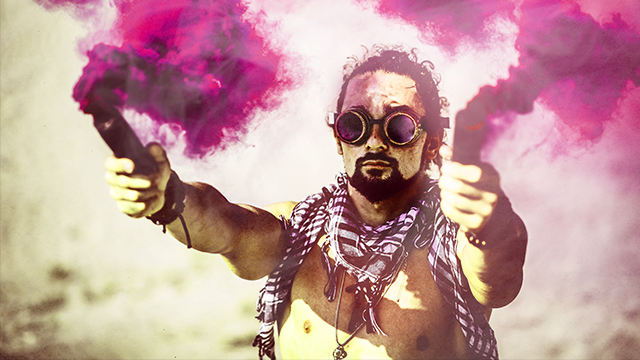
Every year, tens-of-thousands of people gather in Black Rock City — a temporary city erected in northwest Nevada in the Black Rock Desert — for the epic party-spiritual-art-community-building experience of Burning Man. Burning Man prides itself on being a space that is as inclusive as it is self-reliant, emphasizing self-expression and community through immediacy, participation, and decommodification. Also, people dress sexy and use drugs (let’s not be too pretentious about it).
But recently, long-time attendees have noticed a change bolstered by the influence of social media, and it isn’t a positive one. Marian Goodell, the CEO of the non-profit Burning Man Project was shocked to find that the culture of Burning Man was straying from its roots after she attended an academic symposium in Switzerland about the vibe and atmosphere that Burning Man has created. After a presenter from Finland shared dozens of quotes and observations from interviewees, Goodell was taken aback by a comment made by a retired elderly artist:
“I am disappointed with the attitudes of the mutant vehicle and art car folks. Their gatekeepers are very discriminatory on who they let ride. I was actually told, “No, it’s too late for old people to be out, anyway,’ ‘you’re not pretty enough,’ and ‘we’re only picking up hot girls right now.’ I asked other camp members and hear similar stories. One gay couple said they had tried for 3 years to get on a vehicle and they were denied every time.”
You don’t have to know anything about Burning Man culture to know that this behavior sounds incredibly un-chill. It was enough to inspire a lengthy blog post by Marian published on the Burning Man journal highlighting some of the ways in which Burning Man would attempt to course correct.
After last year’s Burning Man, Goodell’s communication team started to compile data examining instances of commodification and exploitation of Black Rock City and the Burning Man Culture. The report ended up being a staggering 55 pages long. The biggest culprit of commodifying and exploiting the Burning Man culture was none other than social media influencers who are wearing and tagging brands in their Burning Man pictures. Goodell points out that “They are using Black Rock City to increase their popularity; to appeal to customers and sell more stuff.” A move that kind of flies in the face of the whole decommodification aspect.
“Isn’t this commodification? Even if the intention is to express gratitude, isn’t this an exploitation of the Black Rock City community?… Posts of gratitude cross-referenced with hashtags started off slow and innocently enough, but are now wildly out of control. Failing to make clear what behavior is unacceptable has compounded the problem.” Writes Goodell.
https://www.instagram.com/p/Btv_V2khICW/
Social media has worked wonders in promoting the lifestyle of Burning Man, but influencers using the setting as a backdrop for product placement miss what makes Burning Man so special. Those that attend purely as consumers miss the goal of the annual gathering by seeking convenience and comfortability. To which Goodell argues, “Burning Man is anything but convenient, and therein lies its transformative potential… Part of what makes Burning Man unique and powerful is that everyone has to work hard to be there.”
In order to remedy this situation, Burning Man has come up with some new rules to ticket buying ahead of the 2019 sale.
- They’re moving the ‘Pre-Sale’ to after the Directed Group Sale. Since directed groups such as theme and mutant vehicle camps and various art collectives are key contributors to Black Rock City, Burning Man wants to attribute space and resources to them first.
- Directed Group Sales will now contain an increase in ticket allotment by 10% more than in previous years.
- Burning Man is expanding its Low-Income Ticket Program by 18% in order to make the festival more accessible to people with smaller budgets.
- Higher-priced tickets will be limited to two-per-person and will see a total reduction of 30%.
- The “Limited Sale” which had tickets valued at $1200 in previous years has been eliminated completely.
Burning Man is also taking aim at camps that try to commodify the experience by creating comfortable and convenient havens for their campers at the expense of others. They’ve sent out various warnings to camps that have violated these rules in recent years, and they’ve outright banned another camp — Camp Humano — after they had been the subject of many complaints by surrounding camps. Mutant Vehicle camps will also see a reduction in their camp size limits, especially those that were too large relative to the number of people it takes to operate the vehicles.
Only time will tell if Burning Man can course correct and turn itself back into the haven of inclusivity they’ve made their name on, but it’s admirable to see such sweeping attempts to remedy complaints, we hope other festivals take notice! Check out Goodell’s full post about Burning Man’s sweeping changes and find out how you can help keep the experience pure here.
If you’re attending this year, don’t shy away from sharing your experiences so long as you aren’t selling something. Otherwise, Burning Man probably just isn’t for you.
https://www.instagram.com/p/BtvaZ5WB8Li/






